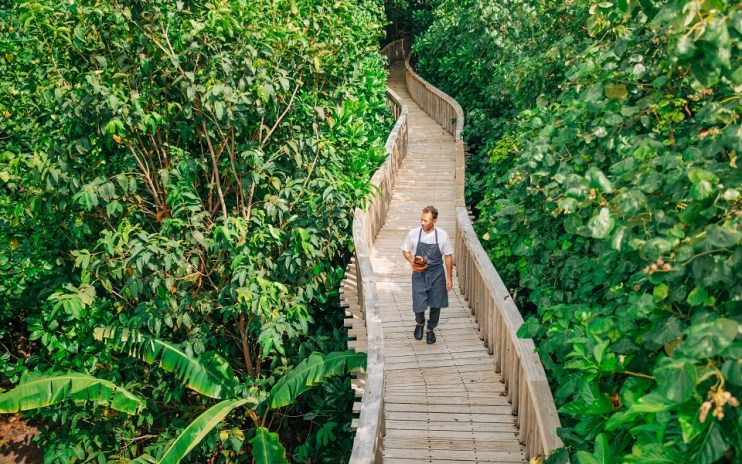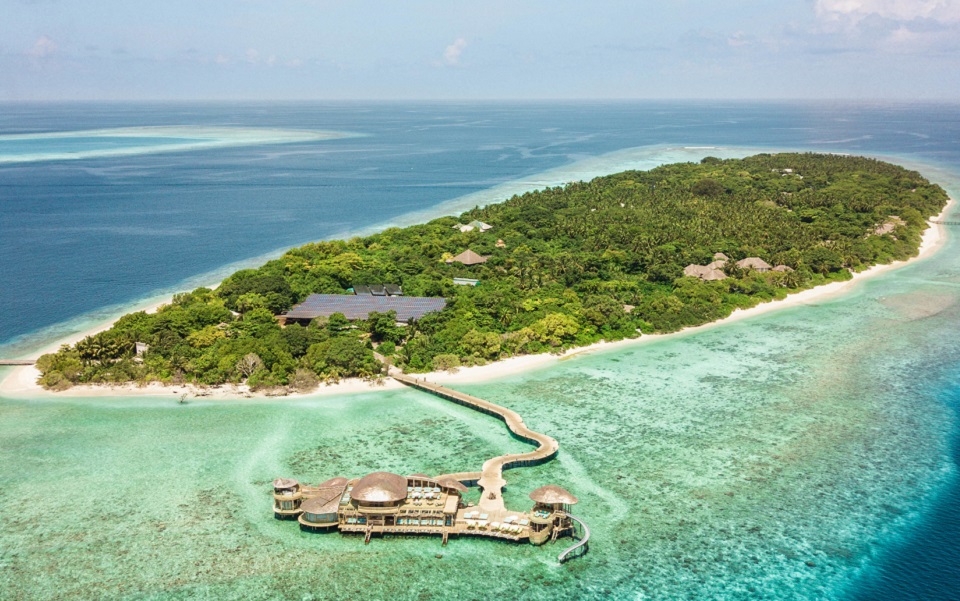How The Maldives are properly celebrating their food culture

On The Maldives, local cuisine is finally being properly celebrated. Angelina Villa-Clarke jets in to eat local delicacies including mud crabs
I’m sat high in the treetops, hidden amongst the oversized leaves of banana trees. Flickering candles light the tables but, mostly, the scene is illuminated by the night sky, ablaze with an eternity of stars. It’s like a gazillion diamonds waiting to be picked by brides-to-be. Indeed, there’s promise in the air for what’s to come.
Fresh in the Garden is one of the Maldives’ most unique restaurants. It is found at the luxury resort Soneva Fushi, in the Baa Atoll UNESCO Biosphere Reserve – a pioneer in the region when it comes to culinary innovation and sustainable practices. It is also currently home to renowned Danish chef Mads Refslund. One of the founders of Noma in Copenhagen, he joins a long line-up of celebrated chefs who have opened a residency at Soneva’s two Maldivian resorts.

Expectations are as high as the restaurant itself. Built amid a canopy of trees, Fresh in the Garden is reached by a swaying rope bridge – a source of much merriment at the end of the night after a couple of ‘Dirty Coconut’ cocktails. In the central, open kitchen, the chefs are in full concentration mode. This is fine dining given a tropical twist, with every dish inspired by the fresh produce grown in the organic gardens found beneath the restaurant.
The aim is to elevate indigenous produce to haute status and I started with the ‘ice’ or raw dishes – ‘Sprouted Coconut’ – hearts of palm topped with Rossini caviar delivered in a hollowed-out coconut, and ‘Flowers from our Garden’ which sees slithers of langoustine and pumpkin seeds served on an ‘ice plate’. ‘Fire’ dishes, meanwhile, were cooked over an open flame. ‘Garden Egg’ sees a confit egg topped with black truffle hidden among a bouquet of the freshest salad leaves. While the ‘Reef Fish’ is roasted in coconut husk, with a green curry paste, served on a huge banana leaf.
“You have to have a purpose above just making money,” hotel founder Sonu Shivdasani tells me over lunch.
For 2023 visitors will enjoy a new twelve month pop-up in homage to “the ecological connection between land, sea, minerals, roots, fruits and animals.” It’s run by Chef Manu Buffara, recently named Latin America’s Best Female Chef by the World’s 50 Best. From Michelin-starred chefs to its inventive ice creams (there are 60 flavours to choose from), culinary prowess is not the only thing that Soneva Fushi excels at.

Opened in 1995, it boasts avant-garde sustainability and community projects, which have been used as a blueprint for ethical tourism worldwide. There’s a serious marine conservation programme; a state-of-the art glass factory which converts waste glass into artworks and an ‘Eco Centro’, which recycles 90% of the resort’s waste. “You have to have a purpose above just making money,” founder Sonu Shivdasani tells me over lunch. He lives at Soneva Fushi, with his Swedish wife Eva, for around six months of the year. “The ‘onion’ is the best description of our journey over these past 25 years. Every time we think that we’ve cracked the ‘code,’ we realise there are more challenges ahead.”
“My main passion is to shine a spotlight on traditional Maldivian cuisine. There are so many international resorts on The Maldives now, that the intrinsic culture of this area is in danger of being lost.
Local chef Sobah Abdullah
We’re eating at another restaurant, Out of the Blue, celebrating Maldivian cuisine. It is overseen by local chef Sobah Abdullah and has the most glorious setting – with the jewel-toned aquamarine seas swirling all around the overwater eatery. “Ah there he is!” exclaims Sonu, as chef Sobah pops over to make sure all is well. The most awarded chef in the Maldives, Sobah gives credit to his parents who inspired him to be hard-working. “My father was a fisherman,” he recalls, “and every day he would bring home the catch. My siblings and I would help smoke it or sun-dry it to sell.”
He continues: “My main passion is to shine a spotlight on traditional Maldivian cuisine. There are so many international resorts on The Maldives now, that the intrinsic culture of this area is in danger of being lost.” On the menu, therefore, is a fusion take on Maldivian classics – ‘Job Fish Carpaccio’, with a delicate sesame dressing; ‘Crab Curry’ served with local vegetables and ‘Reef Fish Tiradito’, with a spicy citrus marinade and Rocoto hot pepper.
As self-proclaimed food connoisseur, Sonu puts great emphasis on the dining offering at both Soneva Fushi and at Soneva Jani, his second resort in the remote Noonu Atoll. The ‘Soneva Stars’ calendar is now four-years strong. It features a rotating roster of big-name chefs from some of the best restaurants in the world, called on to bring their twist on the Maldives’ bounty of produce.

Across the 12 dining destinations at Soneva Fushi, inventiveness is at their core. Flying Sauces, for instance, sees guests ziplining through the jungle setting, stopping en route to enjoy amuse bouche and refreshing fruit ‘shooters’. The experience culminates in a six-course feast eaten amid the towering palm trees. So Primitive, on the other hand, brings guests back down to earth with cuisine taken back to its roots. Found on the beach, you eat with the waves lapping near your feet, and enjoy a series of dishes – many of which are plant-based – cooked over hot coals.
With feasting on the cards every night, it would be easy to skip breakfast, but that would be a mistake. The Mihiree Mithaa restaurant is much like a local market, with ‘stalls’ set up in the sand serving dosas, hoppers and chapatis, typically served with ‘Mas Huni’ (a blend of tuna, coconut and chilli). While Soneva Fushi has a souped-up castaway-island vibe – with its rustic-style villas hidden among the trees – Soneva Jani, a 15- minute sea-plane ride away, immerses guests in ‘big blue’.
It is made up of a string of glamourous villas, complete with slides to whoosh you into the ocean and retractable roofs over the beds, so you can fall asleep under the stars. At Soneva Jani the focus is on creating farm-to-table experiences, harnessing organic produce to support a circular ‘Waste to Wealth’ economy.
On my last day, I head to The Crabshack, a low-key joint on the island’s southwest beach. Many guests and staff I have spoken to – including Christoph – have claimed it is their favourite dining spot and I am curious to find out why. It is overseen by Sri Lankan chef Priyantha. You sit in a driftwood shack, at repurposed tree trunks made into tables. Dishes come ‘neighbourhood-style’ – clams cooked in garlic butter and lemon; juicy prawns a la plancha and, of course, the star of the show – huge mud crabs cooked with black pepper or wok-fried with tamarind and ginger.
Dishes come ‘neighbourhood-style’ – clams cooked in garlic butter and lemon; juicy prawns a la plancha and huge mud crabs with black pepper
“The location is inspirational but also humble,” says the quietly-spoken Priyantha. “It reminds me of my childhood – meals enjoyed on the beach, feet in the sand. Who can ask for anything more?”
Visit the Maldives yourself
Rates for Soneva Fushi start from £1,000 per villa per night based on two people sharing a onebedroom Crusoe villa with pool. Rates at Soneva Jani start from £1,339 based on two people sharing a one-bedroom water retreat. Soneva.com. British Airways flies return to the Maldives with round trips starting from £808 this January. Peak visiting season is December to April.
Read more from City A.M. Travel